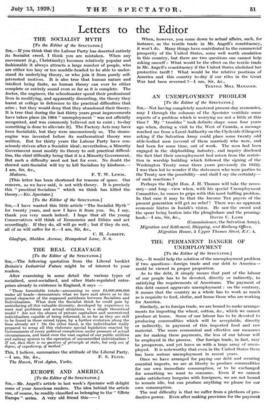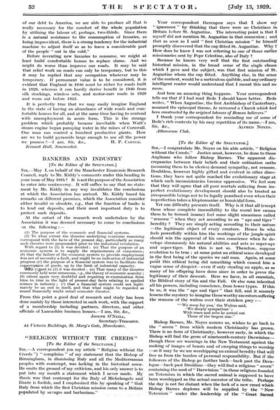THE PERMANENT DANGER OF UNEMPLOYMENT [To the Editor of the
SPECTATOR.]
SIR,—It would help the solution of the unemployment problem if two questions—foreign trade and our debt to America— could be viewed in proper proportion.
As to the debt, it simply means that part of the labour of our people has to be devoted, directly or indirectly, to satisfying the requirements of Americans. The payment of this debt cannot aggravate unemployment : on the contrary, it means that the country as a whole has to work as much as is requisite to feed, clothe, and house those who are working for America.
Similarly, as to foreign trade, we are bound to make arrange- ments for importing the wheat, cotton, &c., which we cannot produce at home. Some of our labour has to be devoted to producing commodities which will be acceptable, directly or indirectly, in payment of this imported food and raw material. The more economical and effective our measures are for making these payments, the less of our labour will be employed in the process. Our foreign trade, in fact, may be prosperous, and yet leave us with a large army of unem- ployed. It is noteworthy that even in the United States there has been serious unemployment in recent years.
Once we have arranged for paying our debt and securing essential imports, we are at liberty to produce commodities for our own immediate consumption, or to be exchanged for something we want to consume. Even if we cannot make satisfactory bargains with foreigners, we are not bound to remain idle, but can produce anything we please for our own consumption.
The real difficulty is that we suffer from a plethora of pro- ductive power. Even after making provision for the payment of our debt to America, we are able to produce all that is really necessary for the comfort of the whole population by utilizing the labour of, perhaps, two-thirds. Since there is a natural resistance to the consumption of luxuries, as being improvident, there is a strong tendency for the industrial machine to adjust itself so as to leave a considerable part of the people " out in the cold."
Before inventing new luxuries to consume, we might at least build comfortable homes to replace slums. And we might do worse than improve our roads. It may be said that relief work on roads can only be temporary, but to this it may be replied that any occupation whatever may be temporary. If permanent value is to be considered, it is evident that England in 1940 must be richer for roads built in 1929, whereas it can hardly derive benefit in 1940 from silk stockings, wireless sets, and motor-cars made in 1929 and worn out before 1935.
It is perfectly true that we may easily imagine England in the state of having an abundance of wide roads and com- fortable houses for all, and at the same time having to contend with unemployment in acute form. This is the strange problem which probably became inevitable when Watt's steam engine began pumping water in the mines of Cornwall. One man can control a hundred productive giants. How are we to build pyramids large enough to use all the power we possess ?—I am, Sir, &e., H. P. CARTER. Kennett Hall, Newmarket.

































 Previous page
Previous page